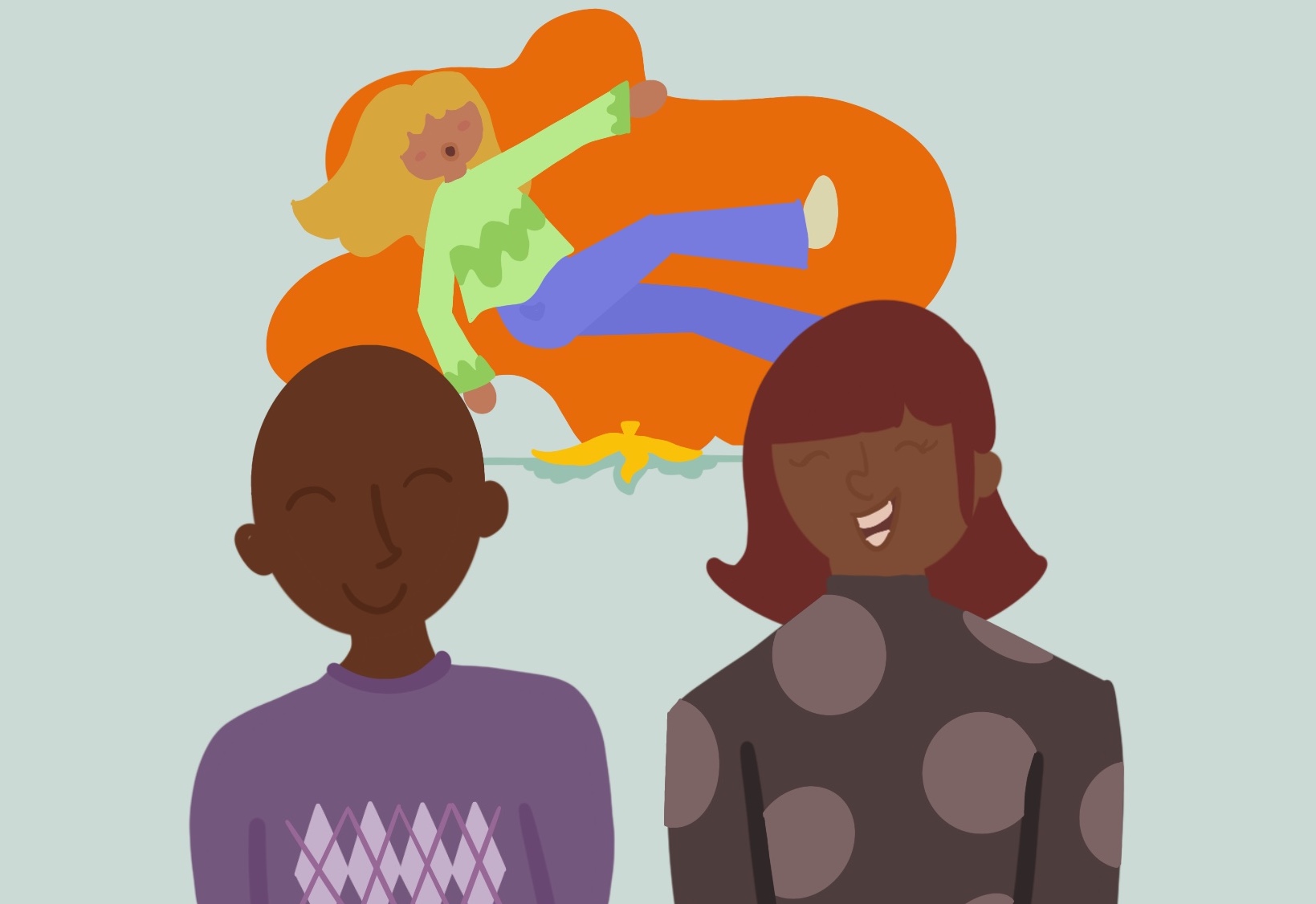Trust me, no one’s watching. Graphic by Reece Butler.
REECE BUTLER | OPINION EDITOR | rmbutler@butler.edu
Just for a moment, be super honest with me — and yourself. How many times have you tripped over your own feet, mispronounced a word in a class reading or even just left to go to the bathroom in the middle of a lecture and felt the eyes of the world on you? Now, how many times have you shared this great humiliation with a dear, trusted friend and heard them respond with some much nicer version of “nobody cares?”
If you are able to honestly answer both of those questions with “more than once,” this is the article for you. If not, I also co-authored the crossword this week. So do that I guess.
Embarrassment is a frustratingly common experience. We have all felt our cheeks grow red and our palms sweat after we do something that could draw unwanted attention from onlookers. But I would venture to say that we rarely accurately assess exactly why we feel it, or how much control we have over the feeling itself.
First-year psychology-criminology major Lily Bea Foster firmly believes that embarrassment is a relatively conscious decision that neglects a genuine understanding of our impact.
“I choose not to be embarrassed; I do think it’s a choice,” Foster said. “I know my place on this Earth, and while I’m grateful for the space that I take up here, I know that it is so, so tiny.”
I am the first to admit that the notion of embarrassment being voluntary is controversial. When I first heard Foster take her position, I struggled to understand how she felt so much agency over something that I considered unavoidable. However, my sense of what is embarrassing has changed so much over my very short lifetime, mostly due to my growing consciousness of social norms. And I seem to experience this phenomenon of embarrassment disproportionately more frequently than other Butler characters with equal exposure to said norms.
Matthew Zetzl is a sophomore criminology major and inarguably the most shameless person I know. Zetzl regularly attends basketball games shirtless with only painted text covering his chest, has danced front-and-center in multiple sorority lip-syncs this semester alone and made quite a splash at last year’s Spring Sings. While he is fully aware of how other people may misinterpret his actions, he approaches the potential for embarrassment with confidence and humor.
“Spring Sings last year … I dressed up like Blue, and I crawled like a dog towards Miss Indiana,” Zetzl said. “And you know what? I looked like an idiot, but I owned it, and people thought it was funny.”
Admittedly, Zetzl’s example is an extreme one, but it is no less relevant to the more mundane embarrassments of life. After all, if someone can pull off a Blue cosplay without feeling too ridiculed, does your minor Freudian slip really matter? I’d argue it doesn’t.
Still, even if you are starting to prescribe to the idea that embarrassment may be optional, it’s no easy feat to get over the habit of feeling it. Perhaps the best way to truly begin to avoid embarrassment is by realizing what it actually is and — in equal measure — what it is not.
Marcia Eppich-Harris, a visiting assistant professor in English and the artistic director for Southbank Theatre Company, is well-versed in opening oneself up to the public view. In her opinion, embarrassment tends to be unwarranted when it comes from a place of fearing failure.
“I don’t think that anybody should be embarrassed about trying to figure out [life],” Eppich-Harris said. “I think it’s part of the learning process.”
All of my interviewees echoed this sentiment in their own way, substantiating the idea that embarrassment, unlike feelings of regret, rarely stems from actions that are legitimately harmful and malicious. Instead, it seems that embarrassment is a reflection of what we assume others are perceiving us as — something that is entirely based on subjectivity and completely open to bias. Instead of looking back at genuine wrongdoings with shame, we instead internalize regular aspects of the human experience.
“We all just want people to like us,” Zetzl said. “I think we just get so worried and think everyone else is perfect because you don’t remember them messing up.”
And by that same logic, other people don’t remember us messing up either.
Foster suggests that what may feel like a uniquely humiliating situation is almost definitely not.
“If it’s happened to you, it’s definitely happened to other people,” Foster said. “That’s what humanity is about; it’s a collective experience … People get embarrassed because they feel polarized by something.”
That feeling of isolation that stirs up embarrassment is not an easy one to get rid of. Instead, it takes conscious effort over time to really see any change. But beginning to focus on the intentional instead of the accidental is the second step. The first? Recognizing that no one actually cares about the happenstances that momentarily set you apart.
Eppich-Harris leans into taking an optimistic stance on humankind to avoid ruminating on potential embarrassments.
“What it comes down to is that I think most people really are good people,” Eppich-Harris said. “We forget that people … are just human beings trying to get through their days as well.”
So, whether you choose to counteract your embarrassment with Zetzl’s humor, Foster’s self-assurance or Eppich-Harris’s rehearsal, know that you have every reason to brush off the things that happen to you. Instead, take pride in the person that you truly are.



